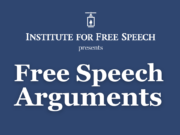At present, the Biden administration is engaged in a legal battle due to their past contact with tech companies like Facebook, YouTube, and Twitter (now called X) to limit speech related to the 2020 election results, criticisms of COVID-19 measures, stories about Hunter Biden’s extracurricular activities, and more.
What critics have called an “Orwellian” suppression of ideas not only restricted false information on these platforms, but also certain truthful or opinion-based viewpoints members of the administration found objectionable. Earlier this month, District Court Judge Terry Doughty issued a preliminary injunction barring federal departments from interacting with social media corporations.
In the midst of this debate over the government’s influence over online content, a new research analysis by Pew Research Center has found that a majority of Americans actually support restrictions related to online speech, particularly regarding the spread of false information and violent content. However, most of the survey respondents agreed that moderation is a role best performed by social media companies themselves, rather than the government.
It’s important to note that the new survey results are also extremely partisan, with 70 percent of Democrats and only 39 percent of Republicans in favor of government intervention in limiting false information online. There is a similar party gap in support for intervention by tech companies. Perhaps most notably, these new results represent a significant change from five years ago, when the vast majority of respondents from either end of the political spectrum believed that freedom of information was more important than moderating false material.
In April, Brad Smith, the Chairman and Founder of the Institute for Free Speech, offered suggestions to Twitter (now X) CEO Elon Musk on how to bolster free speech on the platform and help maintain Twitter’s status as a hub for free expression and open dialogue.
It seems many major tech corporations are now rolling back their misinformation policies from 2020 ahead of the 2024 presidential election, including reinstating accounts for candidates who were banned for spreading false information and allowing content that was previously forbidden.
With this new “hands-off” approach, the 2024 election cycle should be better for free political expression, but the recent findings by Pew paint an alarming picture of a possible future in which large swaths of Americans are comfortable with tech companies—or perhaps even the government—suppressing speech.














